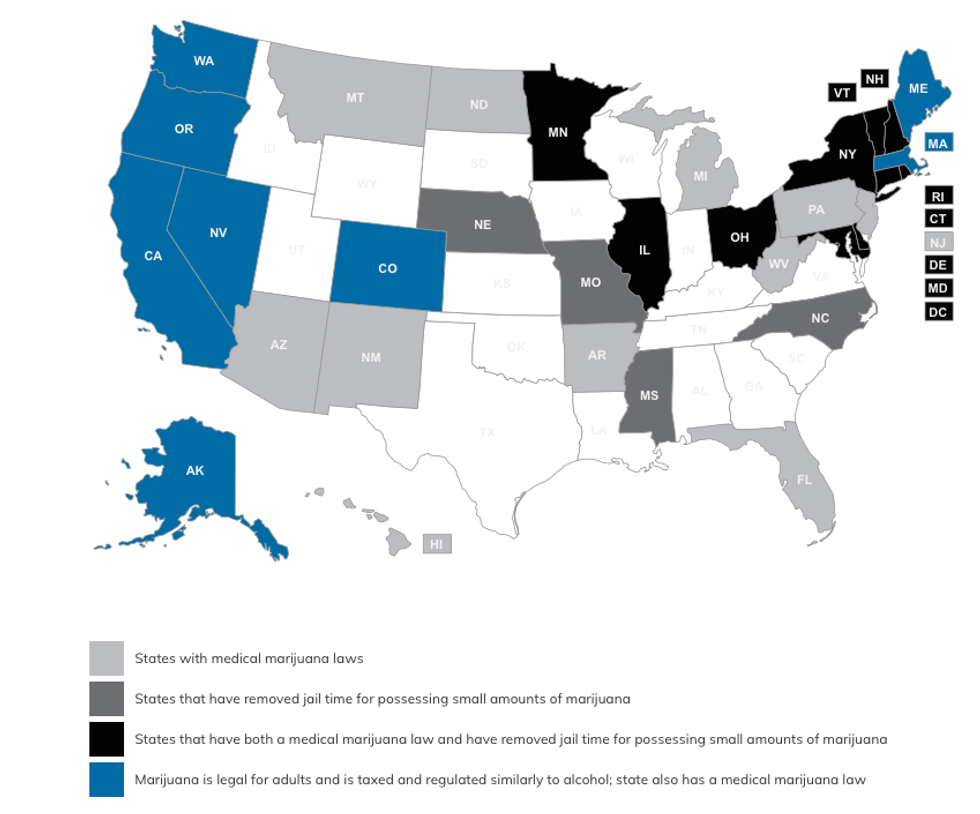

SUBSCRIBE TO OUR FREE NEWSLETTER
Daily news & progressive opinion—funded by the people, not the corporations—delivered straight to your inbox.
5
#000000
#FFFFFF
To donate by check, phone, or other method, see our More Ways to Give page.


Daily news & progressive opinion—funded by the people, not the corporations—delivered straight to your inbox.

Attorney General Jeff Sessions will reportedly rescind the policy that has enabled states to make their own rules about marijuana use. (Photo: Valerio "Dokka" D'Introno/flickr/cc)
On the heels of a California law legalizing recreational marijuana use, which took effect Monday, Attorney General Jeff Sessions is planning to rescind the federal policy that has enabled Americans to grow, sell, and use cannabis in places where it has been legalized, without federal intervention, the Associated Press reported Thursday.
"The move will leave it to U.S. attorneys where pot is legal to decide whether to aggressively enforce federal marijuana law," the AP noted, a move that will likely "add to confusion about whether it's OK to grow, buy, or use marijuana in states where it's legal, since long-standing federal law prohibits it." The report cited anonymous sources with knowledge of the decision.
"RED ALERT!" the Drug Policy Alliance tweeted in response to the report. "This is not a drill. Attorney General Jeff Sessions is going after legalized marijuana."
In California--which was the first state to legalize medical marijuana--state officials have, according to the Los Angeles Times, "issued dozens of permits for retailers to begin recreational sales this week, expanding a market that is expected to grow to $7 billion annually by 2020."
California is the sixth state to introduce the sale of recreational cannabis, following Alaska, Colorado, Nevada, Oregon, and Washington. In response to ballot measures from the 2016 election, Maine and Massachusetts are expected to start sales later this year--despite protest from state leaders like Maine Republican Gov. Paul LePage, who in November vetoed a law that would have regulated the state's marijuana sales.
Several states have passed legislation or ballot measures to relax statewide policies of marijuana use for medicinal and, increasingly, recreational purposes. The Marijuana Policy Project, which lobbies in favor of cannabis-friendly laws, tracks the state-by-state rules on its website:

Sessions is a long-time opponent of the nationwide push to legalize recreational and medicinal use of marijuana. Journalist and former lawyer Glenn Greenwald used the news to offer the analysis that "Conservatives' self-professed belief in federalism was always a huge fraud," tweeting:
Dear Common Dreams reader, The U.S. is on a fast track to authoritarianism like nothing I've ever seen. Meanwhile, corporate news outlets are utterly capitulating to Trump, twisting their coverage to avoid drawing his ire while lining up to stuff cash in his pockets. That's why I believe that Common Dreams is doing the best and most consequential reporting that we've ever done. Our small but mighty team is a progressive reporting powerhouse, covering the news every day that the corporate media never will. Our mission has always been simple: To inform. To inspire. And to ignite change for the common good. Now here's the key piece that I want all our readers to understand: None of this would be possible without your financial support. That's not just some fundraising cliche. It's the absolute and literal truth. We don't accept corporate advertising and never will. We don't have a paywall because we don't think people should be blocked from critical news based on their ability to pay. Everything we do is funded by the donations of readers like you. Will you donate now to help power the nonprofit, independent reporting of Common Dreams? Thank you for being a vital member of our community. Together, we can keep independent journalism alive when it’s needed most. - Craig Brown, Co-founder |
On the heels of a California law legalizing recreational marijuana use, which took effect Monday, Attorney General Jeff Sessions is planning to rescind the federal policy that has enabled Americans to grow, sell, and use cannabis in places where it has been legalized, without federal intervention, the Associated Press reported Thursday.
"The move will leave it to U.S. attorneys where pot is legal to decide whether to aggressively enforce federal marijuana law," the AP noted, a move that will likely "add to confusion about whether it's OK to grow, buy, or use marijuana in states where it's legal, since long-standing federal law prohibits it." The report cited anonymous sources with knowledge of the decision.
"RED ALERT!" the Drug Policy Alliance tweeted in response to the report. "This is not a drill. Attorney General Jeff Sessions is going after legalized marijuana."
In California--which was the first state to legalize medical marijuana--state officials have, according to the Los Angeles Times, "issued dozens of permits for retailers to begin recreational sales this week, expanding a market that is expected to grow to $7 billion annually by 2020."
California is the sixth state to introduce the sale of recreational cannabis, following Alaska, Colorado, Nevada, Oregon, and Washington. In response to ballot measures from the 2016 election, Maine and Massachusetts are expected to start sales later this year--despite protest from state leaders like Maine Republican Gov. Paul LePage, who in November vetoed a law that would have regulated the state's marijuana sales.
Several states have passed legislation or ballot measures to relax statewide policies of marijuana use for medicinal and, increasingly, recreational purposes. The Marijuana Policy Project, which lobbies in favor of cannabis-friendly laws, tracks the state-by-state rules on its website:

Sessions is a long-time opponent of the nationwide push to legalize recreational and medicinal use of marijuana. Journalist and former lawyer Glenn Greenwald used the news to offer the analysis that "Conservatives' self-professed belief in federalism was always a huge fraud," tweeting:
On the heels of a California law legalizing recreational marijuana use, which took effect Monday, Attorney General Jeff Sessions is planning to rescind the federal policy that has enabled Americans to grow, sell, and use cannabis in places where it has been legalized, without federal intervention, the Associated Press reported Thursday.
"The move will leave it to U.S. attorneys where pot is legal to decide whether to aggressively enforce federal marijuana law," the AP noted, a move that will likely "add to confusion about whether it's OK to grow, buy, or use marijuana in states where it's legal, since long-standing federal law prohibits it." The report cited anonymous sources with knowledge of the decision.
"RED ALERT!" the Drug Policy Alliance tweeted in response to the report. "This is not a drill. Attorney General Jeff Sessions is going after legalized marijuana."
In California--which was the first state to legalize medical marijuana--state officials have, according to the Los Angeles Times, "issued dozens of permits for retailers to begin recreational sales this week, expanding a market that is expected to grow to $7 billion annually by 2020."
California is the sixth state to introduce the sale of recreational cannabis, following Alaska, Colorado, Nevada, Oregon, and Washington. In response to ballot measures from the 2016 election, Maine and Massachusetts are expected to start sales later this year--despite protest from state leaders like Maine Republican Gov. Paul LePage, who in November vetoed a law that would have regulated the state's marijuana sales.
Several states have passed legislation or ballot measures to relax statewide policies of marijuana use for medicinal and, increasingly, recreational purposes. The Marijuana Policy Project, which lobbies in favor of cannabis-friendly laws, tracks the state-by-state rules on its website:

Sessions is a long-time opponent of the nationwide push to legalize recreational and medicinal use of marijuana. Journalist and former lawyer Glenn Greenwald used the news to offer the analysis that "Conservatives' self-professed belief in federalism was always a huge fraud," tweeting: